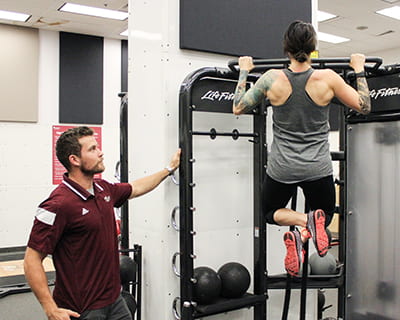Congratulations, you have decided to take your physical activity goals to the next level and start working with a personal trainer! Whether you are just  starting your workout journey, looking for a little extra motivation and accountability, or taking your training to the next level, a trainer can be your ticket to success. But, with the unlimited supply of fitness centres, private studios, online fitness options, and the never-ending supply of “helpful” jacked guys at the gym; how do you choose? With a little bit of preparation and research you can make sure the time and money you invest into personal training is well spent. Here are some recommendations of what to look for:
starting your workout journey, looking for a little extra motivation and accountability, or taking your training to the next level, a trainer can be your ticket to success. But, with the unlimited supply of fitness centres, private studios, online fitness options, and the never-ending supply of “helpful” jacked guys at the gym; how do you choose? With a little bit of preparation and research you can make sure the time and money you invest into personal training is well spent. Here are some recommendations of what to look for:
- Credentials
- Experience/ reputation
- Specialties/ training philosophies
- Convenience
- Cost
- Personality and empowerment
Credentials
When looking for a personal trainer one of the first things to consider is the individual’s knowledge base. Although in some cases, anecdotal evidence and concepts like “practice makes perfect” come into play, it is important that trainers understand why they are prescribing the exercises. Background education in exercise physiology, biomechanics, anatomy, and classes such as principles of strength training are great building blocks for understanding the “why” principle to exercise. So, if possible, looking for a University degree in the areas of physical education, human kinetics, kinesiology or any other related degrees is a good place to start. Second, it is valuable to know if the individual’s knowledge has ever been standardized or challenged by a national governing body such as Canadian Society for Exercises Physiology (CSEP), National Strength and Conditioning Association (NSCA), or the American College of Sports Medicine (ACSM). Attainment of a recognized certification demonstrates that the individual has basic competencies in all areas related to physical activity and associated lifestyle factors and that the individual understands the risks of exercise and is insured.
Experience and Reputation
Often facilities will have one standardized price for the cost of a personal trainer regardless of experience level so it is valuable to learn a little bit about your trainers before committing to a long-term investment. Typically, an individual who has worked in the health and fitness industry for a prolonged period can pick up on movement errors and prescribe modifications or alternatives more quickly and simply from years of practice; often they have also had time to refine their cueing and explanations so you can understand the movements quicker. However, as with everything, experience doesn’t mean perfection, so if possible look for a referral and listen for the trainer’s reputation before committing. This at least lets you know that others have already been satisfied by the service. As a trainer, hearing that a new client has been referred to me is one of the best compliments I can get.
Specialties and Training Philosophies
If you are trying to achieve a specific goal, it’s of benefit to choose a trainer who area of expertise matches your outcome objectives. For example, if you are setting out to run your first 5km race, you will likely get a more refined and effective product from a trainer that specializes in running, as opposed to the body building expert or the powerlifting coach. Although most trainers will be able to give you a program for any variety of skills, it may not be of the same quality. There is a common saying “Jack of all trades, master of none” that describes this idea perfectly. With the broad range of objectives in physical activity it is difficult to master them all. Because of this, trainers tend to narrow their focus, style and training philosophies to a few types of training to perfect their art. Beyond the specific goals, knowing a trainer’s specialties and philosophies will give you insight into the type of workouts you will be doing. That trainer that specializes in running versus that power lifting coach are likely to approach a more generalized goal like weight-loss in a different way.
Convenience
Paying to see a personal trainer should be convenient. Now that you have found a list of facilities that have trainers available that meet your demands of education and expertise, you want to make sure the sessions will align with your life. Is the trainer available at the preferred time of day, day of the week, and frequency that you want to go? Can you fit the commute time in, training session, and change time in that window of time you have available? Is the facility on the way to or from your place of work? Finding a personal trainer that fits your lifestyle best is the ideal way to keep you on track for your physical activity goal.
Cost
It is no secret; personal training can be expensive. When all things are considered you want to make sure personal training fits within your budget. There are a few things you can look for to help reduce the cost up front.
- First, find out what is included. Is the session a full hour? Is the trainer going to give you a program to follow on your own? Does your session entitle you to use the facility outside of training hours? When you are comparing prices, make sure know how much your session includes.
- Within the facility there may be cheaper options available. Is there a group workout option or a group exercise class that can offer a similar outcome? If you have a workout partner is it cheaper?
- Can you buy in bulk? If you can afford to purchase multiple sessions all at once, do some math and figure out what number of sessions will provide you with the best deal per session. A lot of facilities offer discounts when sessions are purchased in bulk.
- Do you have to be a member of the facility? In some rec facilities, the prices posted are only for members, so make sure you ask all the questions.
Personality and Fit
Arguably the most important consideration is whether the individual’s personality and training style will work for you. There are a lot of misconceptions out there that personal trainers are all the same. But, I promise you, not all of us personal trainers like to yell and make you do 100 burpees each workout. Personal trainer’s personalities need to align with your preferences; whether you want the in-your-face-motivator, the quiet-technical-correcting type, the overtly-friendly-conversationalist, or any other personality that may exist- it must work for you.
The personality that works best for you may surprise you, but use your referrals and ask questions before signing up to ensure you are getting what you want. If after your first session you find that things are not going exactly as you expected, remember, personal training is a service. So, if you feel like you got a “lemon” and your trainer’s personality is not aligning with your expectations, speak with your trainer or ask about options to switching to someone else. Don’t let one bad experience sway you away from achieving your physical activity goals. Personal training should be an empowering experience that stimulates personal growth and independence not dependence.
Visit our website for our personal trainer bios and information on fitness program designs plus our new pricing model and incentive program for personal training.


